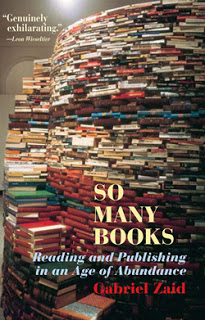
I live books. I read books every day. I review books, translate books, edit books, and write books. I have always had a hard time fathoming why other people don’t shimmer with the same enthusiasm. Perhaps they never developed the habit of reading– it does take some effort to learn, after all; perhaps they simply don’t have a clue about what treasures await them, silently gathering dust upon an infinite number of shelves (both real and digital, pay and free, as in archive.org); or, perhaps they find it too frightening to reach beyond the incuriosity of those around them. (What if they were to arouse some bully? “Hey, Egghead!”)
Of course, many citizens have been gypped– there is really no other word– by their public education system. But over the centuries, and particularly the past two, some of the least privileged, by luck and pluck, have become avid readers and writers. (I speak as a descendant of Irish immigrants.) And indifference and even hostility towards reading and books can be found all across the social spectrum. Some of the wealthiest people, graduates of private schools, don’t have anything beyond a coffee table book and maybe a thriller in their mansions– though, true, some hire decorators who order books by the yard. (One dead giveaway: when the maid rearranges the books by size and no one objects.)
In today’s New York Times David Toscana laments the lack of readers in Mexico and the woeful state of public education. Though I celebrate Mexico’s vibrant and long-standing literary tradition, I have to agree with his sad portrait, alas. And it is not just the less fortunate Mexicans who do not read. When I taught the thesis seminar for seniors at a leading private university in Mexico City, I found the general level of reading and writing skills, shall we say… underwhelming. But why light on Mexicans? Plenty of people in other countries, including my own country, the United States, don’t read. A few years ago, I used to do PEN Writers in the Schools visits in some Washington DC public high schools. In one instance, in their assignment about my collection of short stories, seniors were allowed to draw pictures with crayons instead of writing an essay (I am not kidding). Many graduates of even the finest U.S. colleges don’t read much, either, and oftentimes, in terms of any aesthetic or intellectual nutrition, what they read would be about on par with, say, a Big Mac.

A book is not necessarily expensive. There are public libraries, Internet archives, free Kindles… In Mexico City, I’ve seen street vendors by the metro stations offering scads of used books, many for the price of a glass of orange juice. So why do so many people, whether well off or poor, ignore the riches around them? This is actually a very interesting question. We all do it some way, and not just with books. I don’t pretend to have all the answers. But I believe the future belongs to those with curiosity, creativity, and courage– and anyone with those three attributes, and the opportunity to do so, is more likely than not to end up in a library, either bricks-and-mortar or on-line, and with heartfelt zest.
Toscana writes, “Books give people ambitions, expectations, a sense of dignity.”
I know, I know in my bones, this is true.

So How’s the Book Doing? (And how many copies have you sold? And what was your print run?)
Notes on Poultney Bigelow,
Author, World Traveler, and Pioneer Editor of
“Outing: An Illustrated Monthly Magazine of Recreation”
Find out more about
C.M. Mayo’s books, articles, podcasts, and more.

